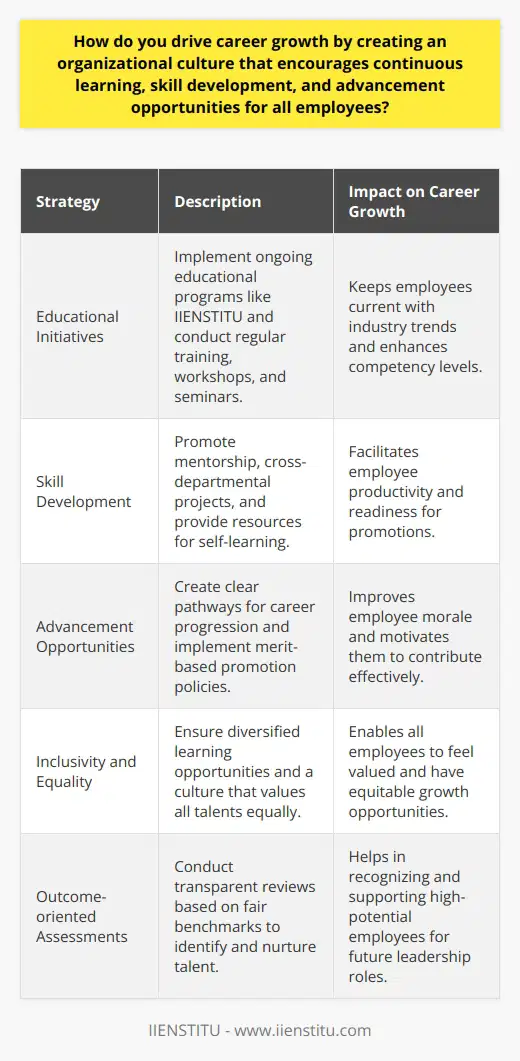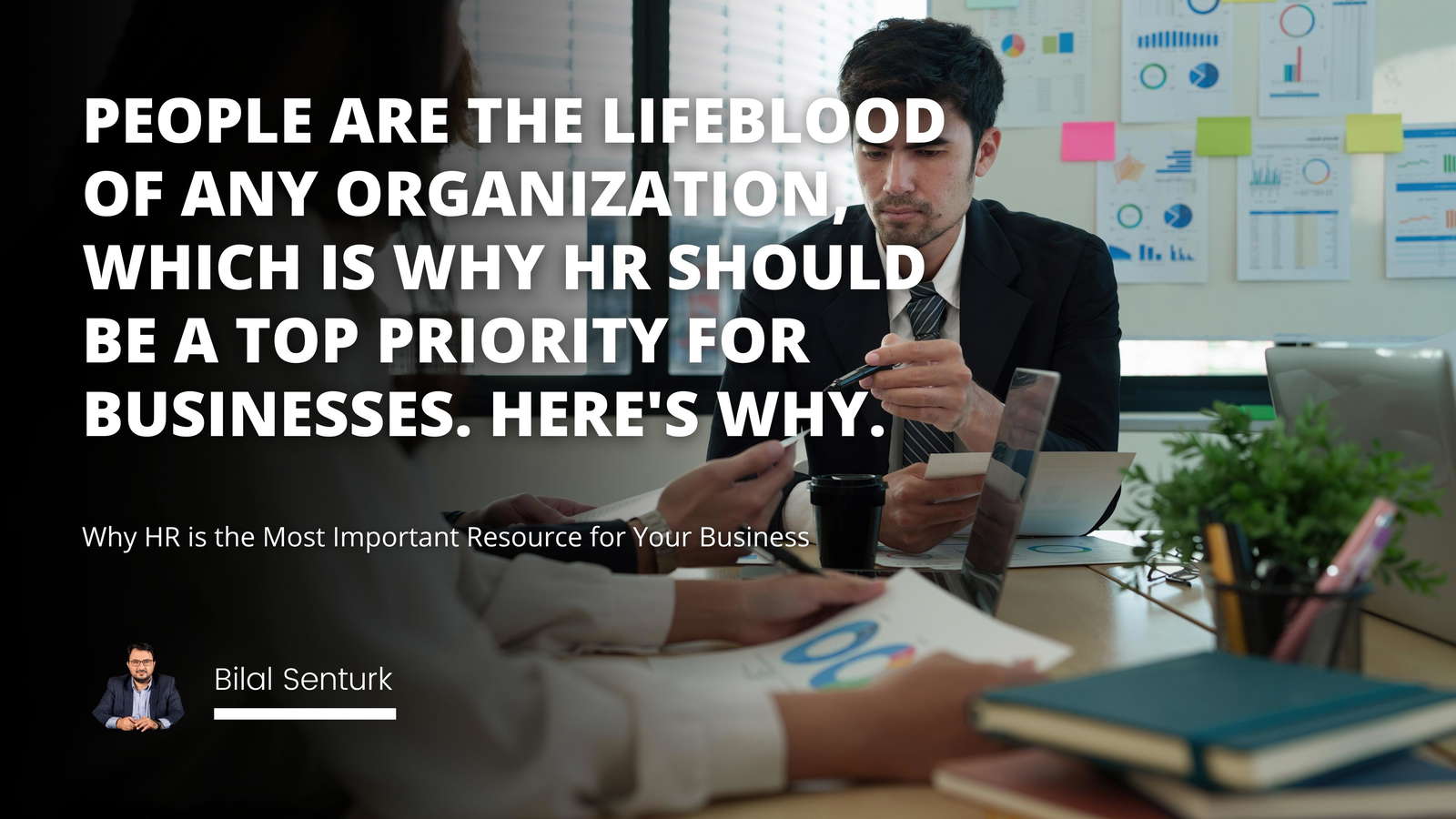
Introduction
Introduction
Definition & Overview
What is Corporate HR?
What Are Its Functions?
Benefits of Corporate HR for Career Development & Growth
Participating in Recruitment & Selection
Professional Development & Training
Motivating Employees
Supporting Staff
Challenges of Corporate HR
Retention
Compliance
Cost of Training & Development
Creating & Maintaining a Positive Work Environment
Conclusion
I still remember my first day at a large corporation—nervously clutching my notepad, hoping I'd make a good impression. As I navigated the maze of cubicles, a friendly face from the Human Resources department greeted me warmly. That simple interaction set the tone for my entire career there. Over the years, I've come to appreciate the profound impact that Corporate HR has on not just individual careers but the overall growth of an organization.
In today's fast-paced business world, where companies are constantly striving to optimize supply chain management process tips and stay ahead of the competition, the role of Corporate HR often goes unnoticed. Yet, it is the backbone that supports employees, fosters a positive work environment, and drives professional development. In this article, we'll delve deep into what Corporate HR truly is, its myriad functions, and how it plays a pivotal role in career development and growth. We'll also explore the challenges it faces and how overcoming them can lead to a more harmonious and productive workplace.
Definition & Overview
What is Corporate HR?
At its core, Corporate Human Resources (HR) is the heart and soul of an organization. It's not just a department that handles paperwork; it's a team dedicated to managing the most valuable asset a company has—its people. From recruiting the right talent to ensuring employee well-being, Corporate HR wears many hats. They've got their fingers on the pulse of the organization's culture, values, and goals.
Think of Corporate HR as the bridge connecting management and employees. They facilitate communication, address concerns, and ensure that everyone's aligned toward common objectives. Their role is multifaceted, involving everything from strategic planning to day-to-day employee interactions.
What Are Its Functions?
Corporate HR's functions are as diverse as they are critical. Here's a closer look:
1- Recruitment and Selection: Finding the right people for the right roles.
2- Employee Development: Offering training and growth opportunities.
3- Compliance Management: Ensuring all legal and regulatory requirements are met.
4- Employee Relations: Fostering a positive work environment.
5- Compensation and Benefits: Designing competitive packages to attract and retain talent.
These functions are not isolated—they're interconnected and often overlap. For instance, motivating employees ties directly into retention, which we'll discuss later.
Benefits of Corporate HR for Career Development & Growth
Participating in Recruitment & Selection
When I first applied for a managerial position, I was amazed at how Corporate HR handled the recruitment process. They didn't just look at résumés; they took the time to understand each candidate's aspirations, strengths, and potential cultural fit.
Personalized Interviews: Rather than generic questions, they delved into scenarios relevant to the company's challenges.
Feedback Loops: After each interview stage, they provided constructive feedback, which was invaluable for my professional growth.
By participating actively in recruitment and selection, Corporate HR ensures that the right talent is not only brought on board but also positioned for success from day one.
Professional Development & Training
One of the standout experiences in my career was attending a leadership workshop organized by our HR department. It wasn't just any training—it was tailored to our organization's needs, focusing on real-world challenges we faced daily.
Corporate HR invests in:
Training Programs: Ranging from technical skills to soft skills like communication and leadership.
Career Pathing: Helping employees map out their career trajectories within the company.
Mentorship Opportunities: Pairing less experienced staff with seasoned professionals.
By offering these resources, HR empowers employees to take charge of their careers, leading to personal growth and, consequently, organizational success.
Motivating Employees
Motivation isn't just about bonuses or perks—it's about creating an environment where employees feel valued and inspired. Corporate HR plays a crucial role in this by:
Recognizing Achievements: Implementing employee recognition programs.
Fostering Work-Life Balance: Offering flexible work arrangements where possible.
Providing Support Systems: Such as counseling services or employee assistance programs.
I recall a time when a colleague was struggling with balancing work and personal commitments. HR intervened, offering flexible hours and support, which not only helped her but also increased team morale.
Supporting Staff
Support from HR goes beyond the professional realm. It's about acknowledging that employees are human beings with needs that sometimes spill over from personal to professional life.
Open-Door Policies: Encouraging employees to voice concerns without fear.
Conflict Resolution: Mediating disputes to maintain a harmonious workplace.
Health and Wellness Programs: Promoting physical and mental well-being.
It is not enough to provide employees with opportunities. Empowering them to take action and pursue growth for a successful career is also essential.
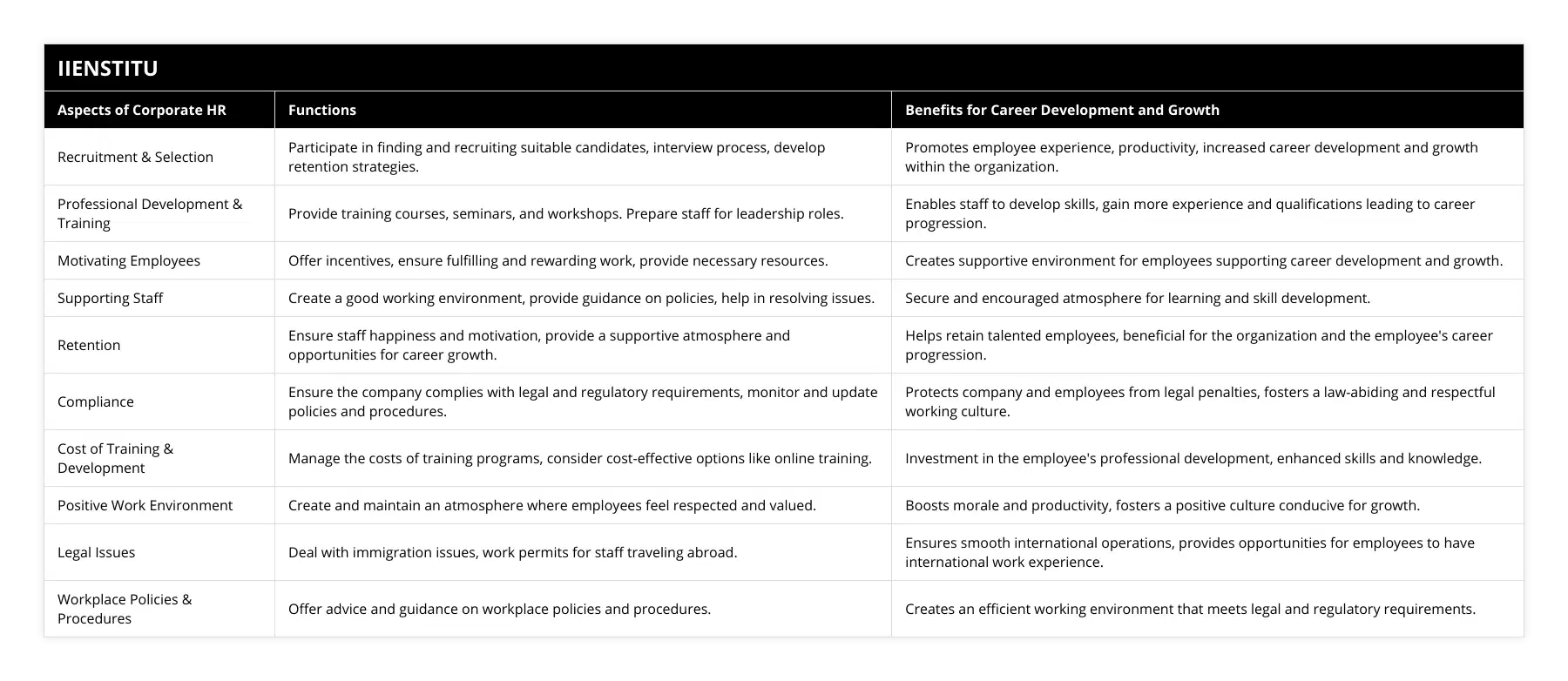
By supporting staff, HR fosters loyalty and a sense of belonging, which are essential for long-term career development and growth.
Challenges of Corporate HR
Retention
One of the most pressing challenges for Corporate HR is employee retention. In competitive industries, talented individuals often have numerous options. Losing key staff can be detrimental.
Strategies to Improve Retention:
1- Competitive Compensation: Ensuring salary and benefits are in line with or exceed industry standards.
2- Career Advancement Opportunities: Providing clear paths for progression.
3- Positive Work Environment: Cultivating a culture where employees feel respected and valued.
Despite best efforts, retaining staff isn't always easy. I witnessed a scenario where, despite generous offers, a team member left because they didn't feel challenged. This highlighted the need for HR to continuously engage with employees about their career aspirations.
Compliance
Navigating the complex world of legal and regulatory requirements is no small feat. From labor laws to industry-specific regulations, Corporate HR must stay updated.
Challenges Include:
Keeping Up with Changes: Laws can change rapidly, and non-compliance can result in hefty penalties.
Training Staff: Ensuring all employees are aware of compliance-related policies.
International Regulations: For global companies, understanding and adhering to laws in different countries.
Failure in compliance doesn't just risk financial loss but can also damage a company's reputation.
Cost of Training & Development
Investing in employee development is crucial, but it comes with costs.
Financial Investment: Training programs, workshops, and courses require funding.
Time Investment: Employees spend time training instead of performing their regular duties.
Measuring ROI: It's challenging to quantify the direct return on investment from training.
However, the cost of not investing in development is often higher, leading to skill gaps and decreased competitiveness.
Creating & Maintaining a Positive Work Environment
A positive work environment is the cornerstone of productivity and employee satisfaction, yet creating and maintaining it is challenging.
Factors to Consider:
Diverse Workforce: Catering to a diverse range of backgrounds and needs.
Communication Barriers: Ensuring transparent and effective communication channels.
Managing Change: Helping employees adapt to organizational changes.
During a major restructuring in our company, HR played a vital role in communicating changes, addressing concerns, and keeping morale high. It was a testament to their importance in maintaining a positive atmosphere.
Conclusion
In essence, Corporate HR is not just a department—it's the heartbeat of an organization. Its influence on career development and growth is profound. By orchestrating recruitment and selection, providing professional development opportunities, motivating employees, and offering unwavering support, HR paves the way for both individual and organizational success.
Yes, challenges abound—retention issues, compliance complexities, training costs, and the delicate task of maintaining a positive work environment. But with strategic planning, empathy, and foresight, these hurdles can be transformed into opportunities.
It's not merely about providing opportunities; it's about empowering employees to seize them. When staff feel supported and valued, they're more likely to take initiative, innovate, and contribute meaningfully to the company's goals.
As I reflect on my journey, the role of Corporate HR has been instrumental. They've been mentors, advocates, and sometimes, a friendly face when one was most needed. In a world where businesses are keen to optimize supply chain management process tips and streamline operations, let's not forget the human element that binds everything together.
References
1- Ulrich, D. (1997). Human Resource Champions: The Next Agenda for Adding Value and Delivering Results. Harvard Business School Press.
2- Armstrong, M. (2014). Armstrong's Handbook of Human Resource Management Practice (13th ed.). Kogan Page Publishers.
3- Dessler, G. (2013). Human Resource Management (13th ed.). Pearson Education Limited.
4- Torrington, D., Hall, L., & Taylor, S. (2008). Human Resource Management (7th ed.). Prentice Hall.
5- Pfeffer, J. (1998). The Human Equation: Building Profits by Putting People First. Harvard Business School Press.
Empower your team, invest in their growth, and watch as your organization reaches new heights—thanks to the often unsung heroes of Corporate HR.
Frequently Asked Questions
What strategies can organizations use to encourage employee development and career growth?
Organizations today need to recognize the importance of investing in their employees to maintain a healthy, productive, and thriving work environment. One of the most effective strategies for achieving this is encouraging employee development and career growth. This can be achieved through various initiatives, including on-the-job learning and development programs, structured career paths, and performance incentives.
On-the-job training and development are effective means of developing employees’ skills and knowledge and making them more effective in their positions. By providing employees with the opportunity to improve their skills and qualifications, organizations can ensure that their employees have the necessary expertise to do their jobs effectively. Furthermore, on-the-job learning can lead to employees feeling more engaged and motivated, which can further contribute to the overall success of the organization.
Structured career paths are an effective way to encourage employees in their development and to provide them with the opportunity to progress in the organization. Organizations should identify and document clear job descriptions and expectations, as well as a set of skills or qualifications required by each position. This allows employees to understand the career ladder that they can climb and provides them with a clearly defined goal to work towards.
Performance incentives can also be used to motivate employees and encourage them to pursue development and career growth. By offering financial and non-financial rewards, organizations can recognize and reward employees who demonstrate superior performance and commitment and encourage them to increase the scope and quality of their work.
In conclusion, organizations should recognize the importance of investing in their employees and create an environment encouraging development and career growth. This can be achieved through on-the-job training, structured career paths, and performance incentives. By doing so, organizations can ensure that their employees are equipped with the necessary knowledge and skills to be successful and engaged, providing a positive and productive environment for everyone.
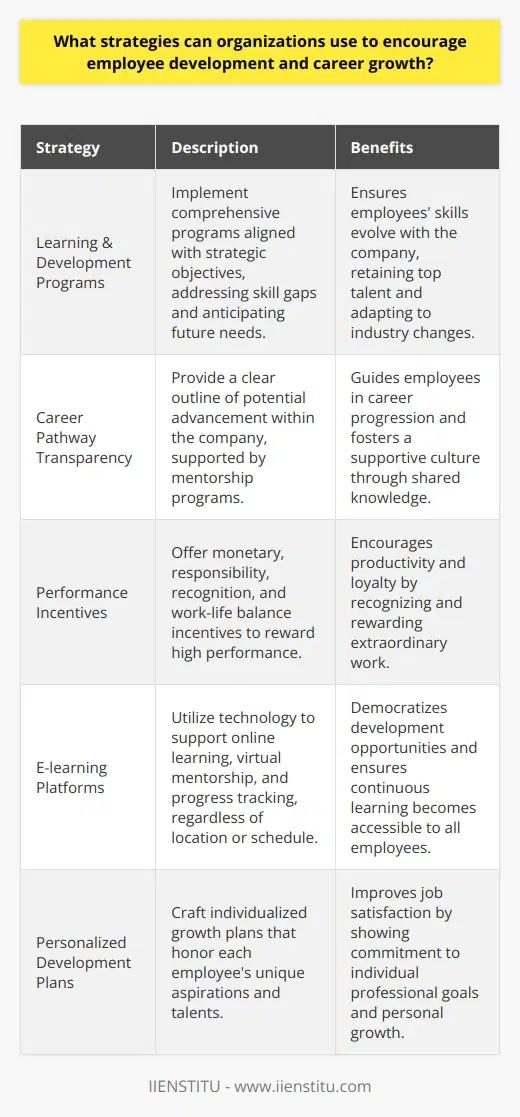
How can organizations help foster a positive tone of voice in the workplace?
Organizations have an essential role in fostering a positive tone of voice in the workplace. A positive tone of voice creates the foundation for productive, trusting, and cooperative communication among members of organizational teams. When employees feel comfortable and respected in their work environment, they are more likely to take ownership of their responsibilities, share ideas, and contribute to the organization's success. Employers can use various strategies to help foster a positive tone of voice in their workplaces.
One way to achieve this goal is to emphasize respect for others. Employers should make sure that employees receive constructive feedback on a regular basis and ensure that everyone is treated with courtesy and respect. This includes respecting the rights of other employees, providing equitable treatment, and avoiding the appearance of favoritism. Employers promoting a workplace culture of mutual respect can help promote a more positive and productive work environment.
Leadership also strongly influences the tone of voice in the workplace. Leaders should strive to create an atmosphere that encourages open communication and collaboration between team members. This includes promoting an environment where everyone's opinion is respected and valued. Leaders should also emphasize the importance of positive and negative feedback and encourage team members to provide feedback on each other's work. Through this approach, leaders can demonstrate their commitment to fostering a positive tone of voice in the workplace.
In addition, employers should strive to create an environment where employees feel comfortable speaking up and expressing their ideas. This includes creating a workplace where diverse opinions and perspectives are valued and actively sought out. Employers should also provide employees with training and resources to help them develop their communication skills. Finally, by creating an environment where employees feel safe and supported, employers can help foster a more positive tone of voice in the workplace.
Finally, employers should seek to create a positive and supportive work environment. A vital component of this is recognizing and rewarding employees for their accomplishments. This includes providing recognition for good work and tangible rewards such as bonuses and pay raises. Additionally, employers should ensure that all employees have the necessary resources to succeed in their roles. Through these efforts, employers can help create an environment conducive to a positive and supportive tone of voice in the workplace.
Overall, employers have an essential role in fostering a positive tone of voice in the workplace. By emphasizing respect for others, empowering leadership, encouraging open communication, and promoting a supportive environment, employers can help create an atmosphere that promotes positive and productive employee communication. In this way, organizations can help foster a positive tone of voice in their workplace.

What techniques can be employed to measure the effectiveness of employee development initiatives?
No organization can survive and thrive in the modern age without a well-trained and educated workforce that can continuously adapt and develop their skills. This is true for both large corporations and smaller organizations. As such, employee development initiatives must be implemented to ensure that staff members have the knowledge and skillset required to succeed. However, to ensure that these initiatives are effective, they must be regularly assessed to determine whether they provide the desired results. In this blog post, we will discuss some techniques that can be employed to measure the effectiveness of employee development initiatives.
One of the most commonly utilized assessment techniques is the development of key performance indicators (KPIs). Establishing a set of KPIs enables organizations to track the progress of their training and development initiatives. This can be done by comparing staff performance before and after participating in the development scheme. Additionally, organizations can measure various metrics, such as increased employee satisfaction, higher staff engagement, and improved productivity.
Another popular technique for evaluating the effectiveness of employee development initiatives is the implementation of surveys. Surveys are an excellent way to obtain feedback from staff members on their training experience. It is also an effective way to assess staff members' knowledge, skills, and attitude gained from the development initiative. Moreover, surveys can be used to uncover any problems or issues that may be occurring during the program, thereby providing valuable insights into its overall effectiveness.
Organizations may also use evaluation techniques such as focus groups, interviews, or appraisals. Interviews and focus groups enable organizations to understand the staff's perspective on the development initiative and whether it meets their needs. Meanwhile, assessments effectively measure the team's progress based on their involvement in the development program.
Finally, organizations should keep track of the costs associated with the development initiative. This will enable organizations to compare the prices of the training program with the expected benefits of improved employee performance. This will help determine whether the development initiative is cost-effective and generates the desired results.
In conclusion, there are a variety of techniques that organizations can use to measure the effectiveness of their employee development initiatives. These include the establishment of KPIs, surveys, focus groups, interviews, appraisals, and the tracking of costs. In addition, a combination of these techniques can help organizations accurately assess the success of their development initiatives.
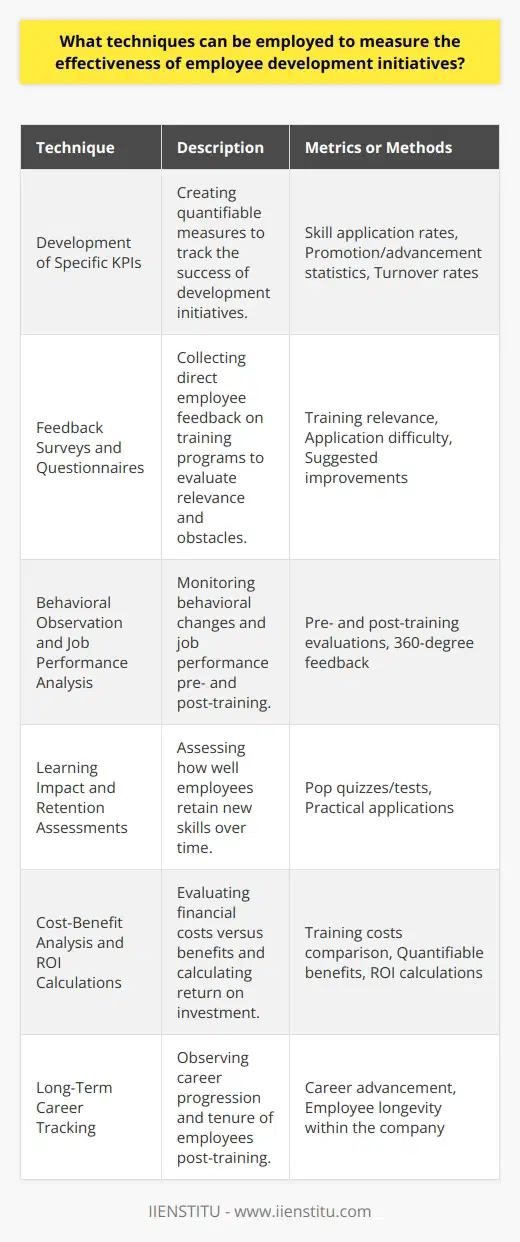
How can HR facilitate the transition between the five stages of career development in HRM?
**Understanding the Five Stages of Career Development**
The five stages of career development in Human Resource Management (HRM) include self-assessment, goal setting, skill development, networking, and advancement. HR plays a critical role in helping employees progress through these stages and ultimately achieve their career objectives.
**Facilitating Self-Assessment**
In the first stage, HR can encourage employees to undertake self-assessment by providing tools and resources, such as personality tests, interest inventories, and career counseling services. This will help individuals identify their strengths, weaknesses, and areas of interest for further development.
**Supporting Goal Setting**
Once employees have successfully completed self-assessment, HR can guide them to set realistic, specific, and measurable career goals. This may involve providing access to information regarding different career paths, promotional opportunities, and required qualifications within the organization.
**Enhancing Skill Development**
As employees aim to achieve their career goals, HR can facilitate skill development by offering various training and development programs. These may include on-the-job training, mentoring, workshops, and e-learning courses tailored to address skill gaps and improve overall performance.
**Promoting Networking Opportunities**
Networking is essential for career development. HR can promote networking opportunities by organizing events, facilitating mentor-mentee relationships, and encouraging employees to join professional organizations relevant to their career interests, fostering connections that can be beneficial in the long run.
**Supporting Employee Advancement**
Finally, HR can facilitate career advancement through transparent evaluation processes and impartial promotion decisions. Performance management systems, employee recognition programs, and succession planning initiatives should be in place to ensure that deserving employees are given opportunities for growth and success in the organization.
In conclusion, HR plays a crucial part in facilitating the transition between the five stages of career development in HRM, allowing employees to maximize their potential and meet their career objectives effectively. By providing support, resources, and guidance throughout each stage, HR contributes to the creation of a productive and engaged workforce that drives organizational success.

What role does career progression play in employee retention and job satisfaction within the HR field?
Role of Career Progression in Employee Retention
Career progression is a critical factor in employee retention and job satisfaction in the human resources (HR) field. HR professionals often seek opportunities to grow, develop their skills, and advance in their careers. These opportunities can include promotions, new job responsibilities, and skill development through training or mentorship programs.
Impact on Job Satisfaction
Research has shown that when HR employees feel their career progression is supported, they can experience increased job satisfaction. This satisfaction can result from increased engagement and a sense of pride in their work, as they develop new competencies and contribute more effectively to the organization. Furthermore, job satisfaction can be a powerful motivator for employees to continue to improve their skills and knowledge and take on new challenges.
Influence on Employee Retention
Matching the employees’ desire for growth and development can greatly impact employee retention. HR professionals who perceive limited or no opportunities for career progression may be more likely to consider leaving the organization to pursue those opportunities elsewhere. On the contrary, HR employees who feel valued and supported in their long-term career goals are more likely to remain committed to their current organization.
Organizational Strategies for Retention
Organizations can take several steps to support the career progression of HR professionals and improve their retention. Implementing a clear career development plan that outlines potential career paths, required skills or qualifications, and opportunities for growth can provide a valuable roadmap for employees. Additionally, offering mentoring programs, training, and development opportunities can help professionals build the skills they need to advance.
In summary, career progression plays a crucial role in employee retention and job satisfaction within the HR field. When organizations invest in the growth and development of their HR employees, they foster a more satisfied and committed workforce. Ultimately, this can result in a more effective and efficient human resources function, benefiting the organization as a whole.
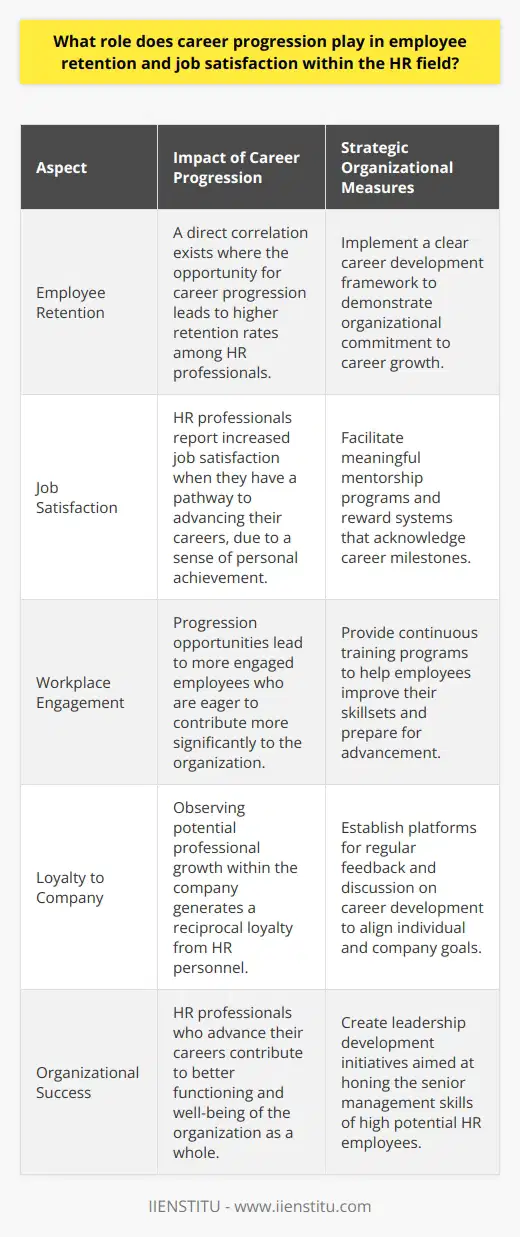
How can organizations ensure that HR professionals are adequately prepared for each of the 4 stages of career development in HRM?
Acquiring Relevant Education and Training
Organizations can ensure that HR professionals are adequately prepared for each of the four stages of career development in HRM by first encouraging them to pursue relevant education and training. This could include obtaining a degree in human resources management or pursuing professional certifications. Some certifications to consider include the Professional in Human Resources (PHR) or the Senior Professional in Human Resources (SPHR).
Mentorship and Networking Opportunities
Another strategy organizations can adopt is to provide HR professionals with mentorship and networking opportunities. By connecting HR professionals with experienced mentors within the industry, organizations enable learning and growth through the sharing of knowledge, best practices, and resources. Networking opportunities can also lead to collaborations that provide valuable insights into diverse aspects of the field.
Ongoing Professional Development
In addition to initial education and training, organizations must facilitate ongoing professional development for HR professionals, which may include workshops, seminars, and conferences. These learning opportunities should be tailored to address the unique needs, challenges, and goals of HR professionals at each stage of their career development. Moreover, organizations should support and encourage continuous learning through sponsorships and flexible work arrangements.
Performance Evaluation and Feedback
Lastly, organizations can ensure the preparedness of HR professionals by regularly evaluating their performance and providing constructive feedback. This process should involve setting clear performance expectations, monitoring progress, identifying areas of improvement, and discussing strategies for growth. By fostering a culture of open communication and continuous feedback, organizations can help HR professionals refine their skills and advance through the stages of career development.
In conclusion, organizations can support HR professionals in their career development by promoting relevant education and training, mentorship and networking, ongoing professional development opportunities, and regular performance evaluations with constructive feedback. These strategies not only help HR professionals perform at their best, but also contribute to the overall effectiveness and success of the organization.
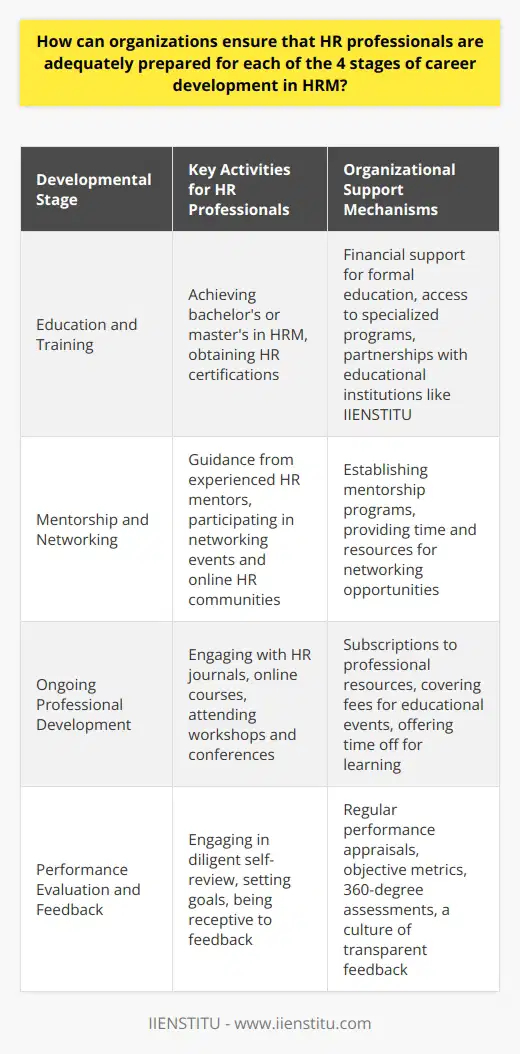
How does HR support employees during the various stages of career development in HRM?
HR Support in Career Development Stages
In the realm of human resource management (HRM), HR professionals play a crucial role in supporting employees throughout their career development journey. This support is provided in various stages, ensuring employees maximize their potential, personal, and professional growth.
Career Planning and Goal Setting
Initially, HR professionals assist employees in identifying their career interests, strengths, and areas for improvement. By providing guidance on career paths and goal setting, HR establishes a strong foundation for growth and development.
Skill Development and Training
To achieve their career objectives, employees require the right set of skills and knowledge. HR supports this by providing access to training programs and learning opportunities, honing employees' technical and soft skills for career advancement.
Performance Management
Regular performance evaluations are essential in informing employees about their progress, strengths, and areas needing improvement. HR's role here includes designing and administering performance management systems that provide constructive feedback and facilitate employee development.
Mentoring and Coaching
HR support also extends to providing mentorship and coaching opportunities for employees. By linking employees to experienced mentors within the organization, HR fosters relationships that facilitate learning and promote overall career growth.
Internal Mobility and Promotions
HR is responsible for managing talent within the organization, filling open positions with qualified internal candidates. By promoting internal mobility, HR not only provides employees with new growth opportunities but also retains valuable talent within the organization.
Work-Life Balance
Lastly, HR also focuses on creating a healthy work-life balance to ensure employees remain engaged and productive in their careers. By implementing flexible work arrangements, promoting employee wellness, and offering other support mechanisms, HR contributes positively to employees' overall wellbeing and career satisfaction.
In conclusion, HR plays an instrumental role in facilitating employee career development through a variety of strategies such as goal setting, training, performance management, mentoring, internal mobility, and work-life balance. By providing such comprehensive support, HR professionals contribute significantly to employees' personal and professional growth within the organization.
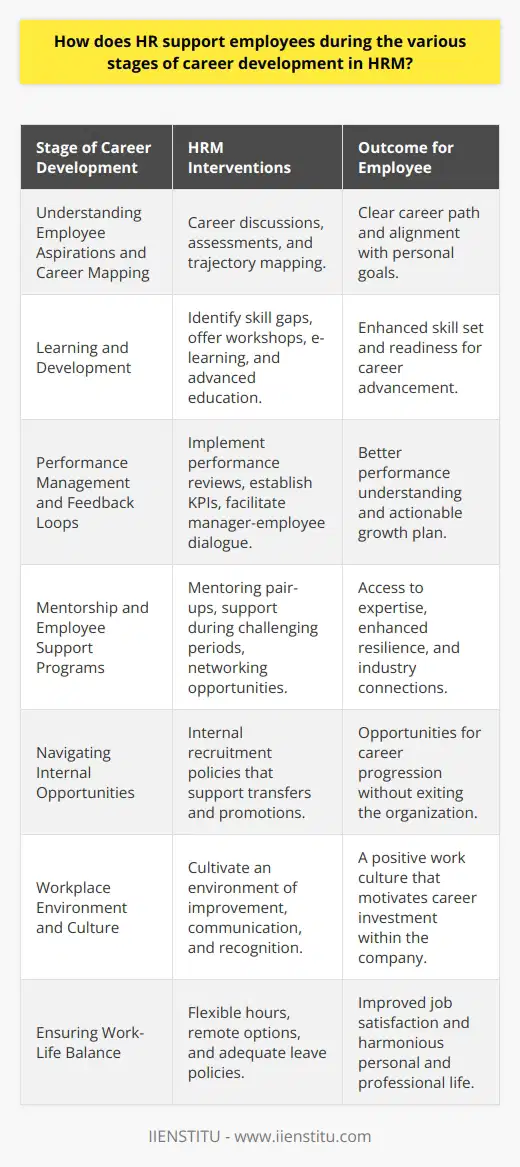
What core competencies are required to effectively navigate the career progression path for HR professionals?
Core Competencies for HR Professionals
Effective Communication
A crucial competency for HR professionals is the ability to communicate effectively. This includes both verbal and written communication, listening skills, and the ability to advocate for the organization's values and policies. As HR professionals progress in their careers, they need to develop strong interpersonal skills to collaborate with employees, managers, and external partners.
Problem-solving and Decision-making
HR professionals must be adept at solving problems and making informed decisions, often based on incomplete or conflicting information. This requires critical thinking, sound judgment, and the ability to analyze complex situations. As HR professionals move up the organizational ladder, they need to make effective, data-driven decisions that consider employee and organizational needs.
Adaptability and Flexibility
The rapidly changing business environment necessitates HR professionals to be adaptable and flexible. They must be able to acclimate to new technologies, processes, and philosophies while promoting a culture of adaptability within their organizations. As they progress in their careers, HR professionals should demonstrate a growth mindset, being open to learning and embracing change.
Relationship Building
Establishing and maintaining strong relationships with colleagues, employees, and external partners is essential for HR professionals. This requires empathy, emotional intelligence, and genuine interest in supporting the growth and development of others. As HR professionals assume more leadership responsibilities, they need to foster a culture of trust, engagement, and belonging.
Confidentiality and Ethics
HR professionals often manage sensitive information, necessitating a high level of confidentiality and ethical conduct. They should have a strong understanding of relevant legal and compliance requirements and ensure that employee data is managed with care. As they advance in their careers, HR professionals must advocate for ethical behavior and decision-making throughout their organizations.
Strategic Planning and Execution
To successfully navigate the career progression path, HR professionals need expertise in strategic planning and execution. This includes understanding the organization's mission, vision, and goals and aligning HR initiatives to support business objectives. As they move into leadership positions, HR professionals should be able to develop and implement comprehensive strategies to manage talent, drive performance, and foster organizational growth.
In conclusion, developing the core competencies of effective communication, problem-solving and decision-making, adaptability and flexibility, relationship building, confidentiality and ethics, and strategic planning and execution are essential for HR professionals to effectively progress in their careers. By honing these skills, HR professionals can contribute to their organizations' success while advancing their own career development.
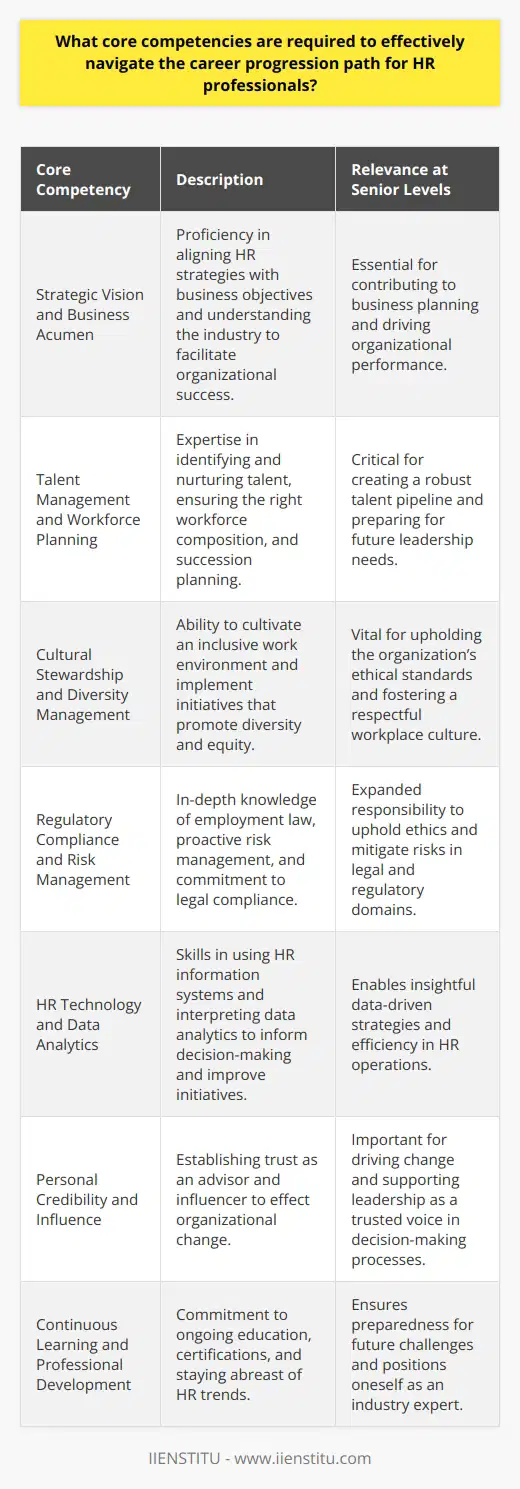
How do HR functions evolve across the 4 or 5 stages of career development, and what implications does this have for HRM?
HR Functions and Career Development Stages
The evolution of HR functions across the four or five stages of career development has significant implications for human resource management (HRM). These stages include exploration, establishment, maintenance, and disengagement, with some models adding a consolidation stage between establishment and maintenance.
Exploration Stage
In the exploration stage, HRM should focus on identifying and attracting talent, as well as providing support in career planning and development. This includes offering internships, apprenticeships, and graduate programs to help individuals gain experience and make informed decisions about their future careers.
Establishment Stage
During the establishment stage, employees begin building their professional identity and seek to advance within their chosen fields. HRM plays a crucial role in providing opportunities for skill development, training, and mentorship. These efforts enable employees to gain the necessary knowledge, skills, and abilities to fulfill their career aspirations.
Consolidation Stage (Optional)
In the consolidation stage, employees focus on enhancing their professional reputation and solidifying their position within the organization. HRM should facilitate this growth by offering tailored development opportunities, fostering a culture of upward mobility, and encouraging networking among employees.
Maintenance Stage
Throughout the maintenance stage, HRM must support employees as they adapt to new challenges and maintain their skills. This could involve additional training, job rotation, or exposure to new projects. At this stage, HRM should also be mindful of potential burnout and implement strategies for maintaining a healthy work-life balance.
Disengagement Stage
Finally, within the disengagement stage, HRM should guide employees through the process of preparing for retirement. This includes offering financial planning services, identifying potential successors, and facilitating intergenerational knowledge transfer.
Implications for HRM
In summary, the evolution of HR functions across career development stages highlights the need for HRM to adopt a dynamic, multifaceted approach to managing human resources. By understanding the unique requirements and priorities of each stage, HRM can ensure that employees have the necessary support and resources to succeed, thereby contributing to the overall success of the organization.

What are the key factors that influence career development within the HR field?
Key Factors in HR Career Development
The Human Resources (HR) field encompasses various aspects, demanding a distinctive set of skills and experiences to excel in different roles. Several key factors influence an individual's career development within the HR field.
Acquiring Relevant Education
Possessing a strong educational background in areas like business administration, psychology, or human resources management forms the foundation for successful HR career development. A bachelor's degree is a minimum requirement for most positions, while advanced degrees like a master's in human resources or related fields can expedite career progression and unlock more senior roles.
Professional Experience and Networking
Hands-on experience in the HR domain, be it an internship or entry-level position, enables individuals to apply theoretical knowledge in real-world scenarios. Furthermore, building a strong professional network serves as a valuable asset when seeking new opportunities or learning from industry peers.
Staying Updated with Industry Trends
As with most fields, staying current with industry trends and changes in labor laws is imperative for successful career development in HR. Continuous learning through industry journals, attending conferences, and participating in webinars equip HR professionals with the latest know-how to stay ahead of the curve.
Developing Essential Skills
Effective communication, problem-solving, and negotiation skills are crucial for success in the HR field. Professionals who develop and demonstrate these abilities can excel in areas like conflict resolution, employee training, and talent acquisition. In addition, expanding one's skillset by learning data analysis, performance management, and employee engagement augments career prospects.
Obtaining Professional Certifications
Earning internationally recognized certifications, such as the Professional in Human Resources (PHR) or Senior Professional in Human Resources (SPHR), demonstrates mastery of specific HR domain areas. These certifications not only validate a professional's expertise but may also lead to increased career opportunities and salary potential.
In conclusion, career development in the HR field hinges on a combination of factors. A robust educational foundation, relevant professional experience, continuous learning, skill development, and industry certifications contribute to an individual's success, opening the door to a diverse range of roles within the HR spectrum.
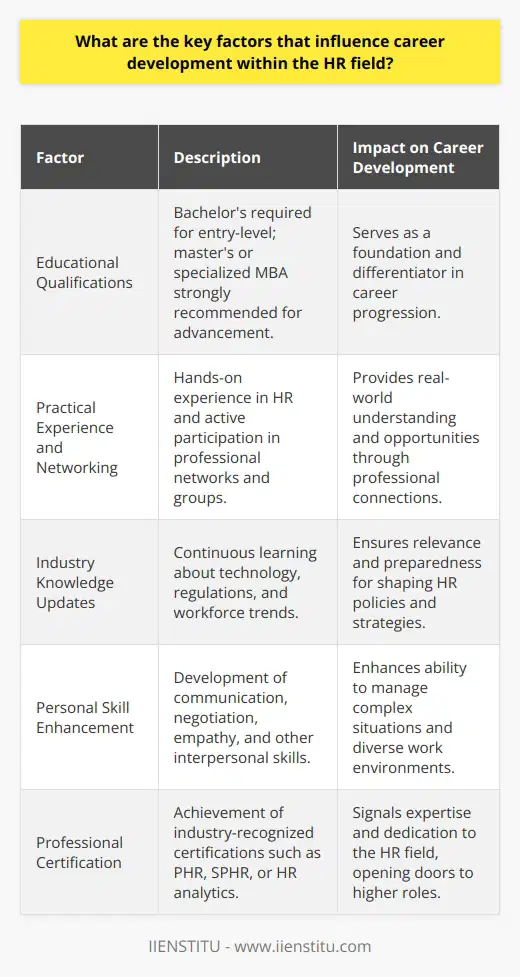
How can HRM practices foster a more inclusive and diverse work environment throughout all stages of career progression?
Inclusive Hiring Process
To foster a more inclusive and diverse work environment, HRM practices should begin with inclusive hiring processes. This involves making job descriptions and requirements accessible to a wider range of candidates, ensuring unbiased selection, and adopting diverse interview panels. By implementing such measures, organizations can attract a diverse pool of talent, thereby promoting inclusivity from the beginning of employees' career growth.
Employee Training and Development
One effective way to ensure diversity and inclusiveness in the workplace is by offering tailored employee training and development programs. By educating employees about diversity, equity, and inclusion, organizations can encourage workers to recognize their fellow employees' unique attributes and be more mindful of diverse perspectives. Furthermore, dedicated skill development programs for underrepresented groups can enhance career progression prospects and uplift the diverse workforce.
Offering Mentorship Opportunities
HRM practices can also prioritize inclusive mentorship opportunities, pairing employees from diverse backgrounds with experienced and supportive mentors. This approach can help employees develop essential skills, gain relevant knowledge, and build meaningful connections within the organization. By establishing mentorship programs that cater to different backgrounds and skill levels, employers can actively support career progression across various employee segments.
Creating Inclusive Company Policies
Inclusive and diverse work environments can be cultivated through the strategic implementation of company policies. Effective equal opportunity policies, anti-discrimination policies, and family-friendly policies can directly influence career progression for diverse groups of employees. For example, providing flexible work arrangements may enable employees from various backgrounds to achieve work-life balance, contributing to their success in the workplace.
Employee Resource Groups
Lastly, HRM practices can involve the establishment and support of Employee Resource Groups (ERGs) to promote inclusivity and diversity across career stages. These are employee-led initiatives based on shared characteristics such as race, gender, or cultural background. By participating in ERGs, employees can gain opportunities for networking, professional growth, and advocacy, ultimately fostering a sense of belonging within the workplace and contributing to a supportive environment that accommodates career progression.
In conclusion, HRM practices can contribute to a more inclusive and diverse work environment throughout all stages of career progression by focusing on aspects such as inclusive hiring, employee training and development, mentorship programs, inclusive company policies, and Employee Resource Groups. Employers who proactively address these areas can enhance their workplace culture and support diverse employees in achieving their full potential.
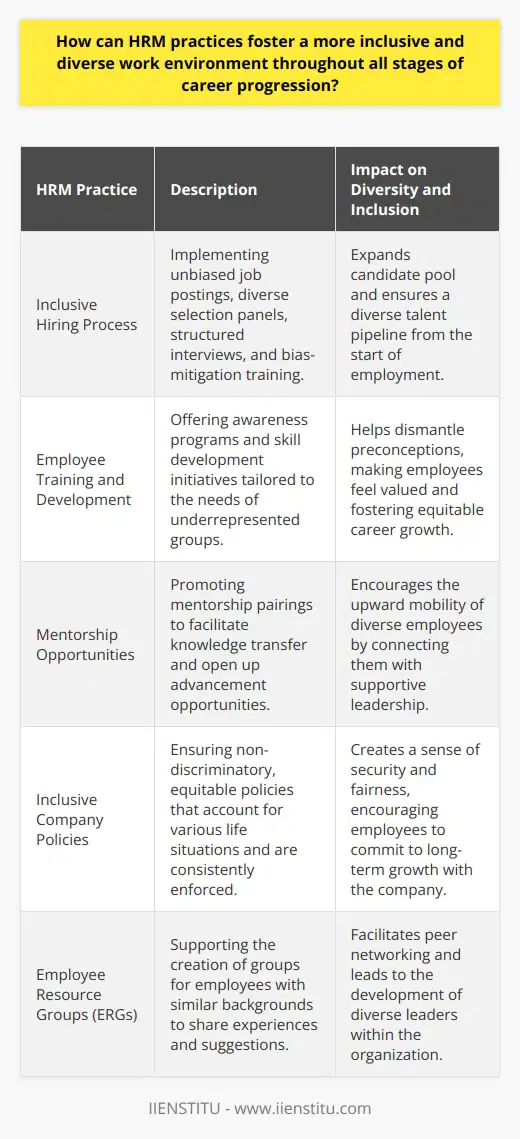
What role do mentoring and coaching programs play in supporting career development and employee growth in HR professions?
Role of Mentoring and Coaching Programs
In the realm of human resources (HR) professions, mentoring and coaching programs hold undeniable importance for career development and employee growth. With customized approaches to address individual needs, these programs pave the way for professional advancement by fostering critical skills and nurturing talent.
Skill Enhancement through Expert Guidance
Mentoring programs offer a platform for both newcomers and experienced professionals to learn and grow. Through these structured relationships, less-experienced employees acquire essential knowledge and skills from seasoned HR practitioners, encouraging efficient skill transfer and enabling the development of a robust workforce.
Creating a Culture of Learning and Development
Coaching supports employees in achieving their full potential by cultivating a learning mindset. In a coaching session, HR professionals identify strengths and areas of improvement, equipping employees with guidance and resources needed to overcome challenges. Coaching programs facilitate an adaptive learning environment, fostering curiosity and resilience in employees.
Networking and Relationship Building
Mentoring and coaching programs also present opportunities to establish meaningful connections and networks with industry veterans. By engaging with experienced professionals, mentees and coachees can leverage valuable insights to steer their careers in the right direction, potentially uncovering previously undiscovered career paths.
Boosting Employee Engagement and Retention
A well-executed mentoring or coaching program can significantly enhance employee engagement, satisfaction, and retention. When companies invest time and resources in employee growth, it fosters a sense of loyalty and commitment towards the organization, thereby positively impacting the overall workforce stability.
Developing Future Leaders
These programs play a pivotal role in shaping future HR leaders by nurturing skills and qualities crucial for leadership roles. By offering curated learning experiences and promoting critical thinking, coaching and mentoring initiatives equip aspiring HR professionals with the tools required for strategic decision-making and leading high-performing teams.
In conclusion, mentoring and coaching programs serve as catalysts for employee growth, positively influencing the trajectory of HR careers. By offering tailored learning experiences and fostering a conducive environment for professional growth, these programs contribute to shaping well-rounded HR professionals, eventually culminating in a competent and thriving industry landscape.
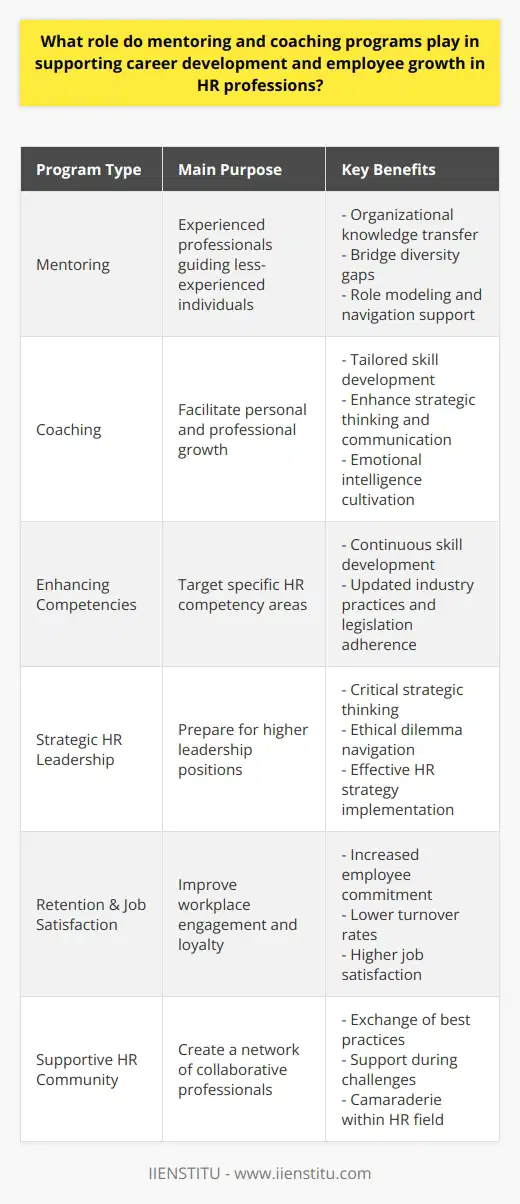
How does HR help with career development and ensure employees are provided with growth opportunities within an organization?
Career Development through HR Initiatives
Effective human resource (HR) management plays a crucial role in employee career development and growth within an organization. HR professionals strategically design and implement a variety of initiatives to support employees in their quest for personal and professional development. By doing so, they not only foster a supportive work environment, but also contribute to the organization's overall performance and success.
Performance Appraisals and Feedback
One of the core functions of HR in career development involves conducting regular performance appraisals. These evaluations provide employees with constructive feedback on their strengths, areas for improvement, and career progression opportunities. By identifying individual employee needs, HR professionals can guide them in the right direction and offer targeted assistance for growth.
Skill Enhancement and Training Programs
In order to facilitate career advancement within an organization, HR managers organize skill enhancement and training programs that equip employees with the necessary competencies to excel in their current roles or to prepare them for higher positions. These programs may include work-related workshops, seminars, educational courses, or certifications that align with the individual's career objectives and the organization's needs.
Mentoring and Coaching Support
HR departments often establish mentoring and coaching programs to connect experienced employees with those seeking guidance and support in their career journey. These relationships provide a platform for knowledge sharing, skill development, and professional networking, which can ultimately lead to employee growth and progression within the organization.
Internal Job Opportunities
Promoting from within is a key approach used by HR to encourage career development. By making employees aware of internal job openings and offering them the chance to apply, organizations create growth opportunities for individuals to advance within the company. This practice not only nurtures talent but also boosts employee morale and motivation.
Succession Planning
Lastly, HR plays an integral role in identifying and grooming potential candidates for leadership succession. This process helps ensure the organization's long-term success by equipping employees with the necessary skills and experiences to assume key positions in the future. By developing a strong pipeline of internal talent, organizations can effectively respond to changes in leadership and maintain a competitive edge.
In conclusion, HR is instrumental in fostering employee career development and providing growth opportunities within an organization. By adopting appropriate strategies, delivering targeted support, and continuously engaging with employees, HR professionals significantly contribute to individual and organizational success.
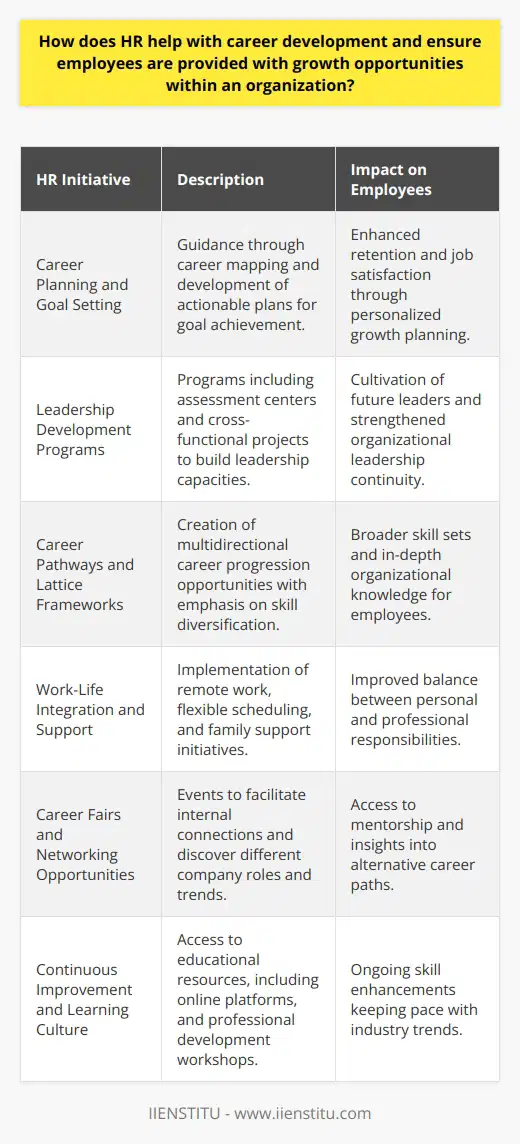
What are the key components of an effective HR strategy when it comes to supporting individuals through the five stages of career development in HRM?
Key Components of HR Strategy
An effective HR strategy for supporting individuals through the five stages of career development in HRM consists of several key components.
Career Planning and Guidance
Firstly, career planning and guidance should be provided throughout the career development process. This involves setting realistic career goals and objectives for employees, assessing their skills and strengths, and identifying opportunities for growth and development.
Training and Skill Development
Secondly, targeted training and skill development programs are essential in supporting employees in their professional growth. These initiatives should be aligned with the needs of both the employees and the organization. This will ensure that employees are equipped with the necessary skills to perform well in their current and future roles.
Mentoring and Coaching
In addition, mentoring and coaching programs can offer employees valuable guidance and support. Through these programs, experienced professionals can impart their knowledge and expertise to more junior employees, assisting them in navigating the various stages of their careers.
Performance Management
Effective performance management systems should also be implemented in order to monitor and manage employee progress throughout the career development process. By setting clear expectations and benchmarks, employees can be guided towards achieving their career goals and objectives.
Recognition and Rewards
Finally, a well-designed recognition and rewards system is crucial for motivating employees to perform well and to develop their careers within the organization. This could include financial or non-financial rewards, such as acknowledgement of accomplishments, promotions or opportunities for professional development.
In conclusion, a successful HR strategy for supporting individuals through the career development process should encompass career planning and guidance, targeted training and skill development, mentoring and coaching programs, performance management systems, and recognition and rewards. These key components must be carefully integrated to ensure employees receive the necessary support to progress through the various stages of their professional lives in HRM.

How can HR professionals leverage their expertise and skills to drive their own career progression within the HR field, and what resources or tools can they utilize to facilitate this process?
Developing Expertise and Skills for Career Progression
HR professionals can drive their career progression in the HR field by continuously developing and fine-tuning their expertise and skills. This requires a thoughtful approach to self-assessment of their current abilities and identifying areas of growth. Pursuing additional certifications and courses, attending industry conferences, and staying informed about HR trends and best practices are essential for staying up-to-date and competitive in the job market (Armstrong & Taylor, 2020). Pursuing professional qualifications such as PHR, SPHR, or SHRM-CP can also enhance their credibility and marketability (Hendijani et al., 2021).
Mentorship and Networking Opportunities
Building strategic relationships with experienced professionals and mentors can facilitate career development in the HR field. These relationships can provide essential support and guidance on various aspects of career growth, such as job hunting, skill development, and staying relevant in the field (Cotton et al., 2020). HR professionals can leverage their connections through networking events, social media platforms, like LinkedIn, and participating in professional associations, such as the Society for Human Resource Management (SHRM) and local HR chapters.
Utilizing Technology and Online Resources
In today's digital age, technology plays an integral role in the progression of HR careers. HR professionals should take advantage of online resources and available technology to enhance their skills and knowledge in areas like diversity and inclusion, analytics, talent management, and HR data analysis (Pritchard, 2021). Various tools, software, and applications can help streamline processes, provide valuable insights, and improve overall efficiency. By keeping up with technological advancements and incorporating these resources into their daily workflow, HR professionals can demonstrate value to their organization and accelerate their career progression in the HR field.
HR professionals can leverage their expertise and skills to drive their own career progression within the HR field through a combination of continuous learning, strategic networking, and the effective use of technology and online resources. These approaches can assist HR professionals in staying relevant, informed, and adaptable in an ever-evolving HR landscape, thus maximizing their potential for career growth and success.
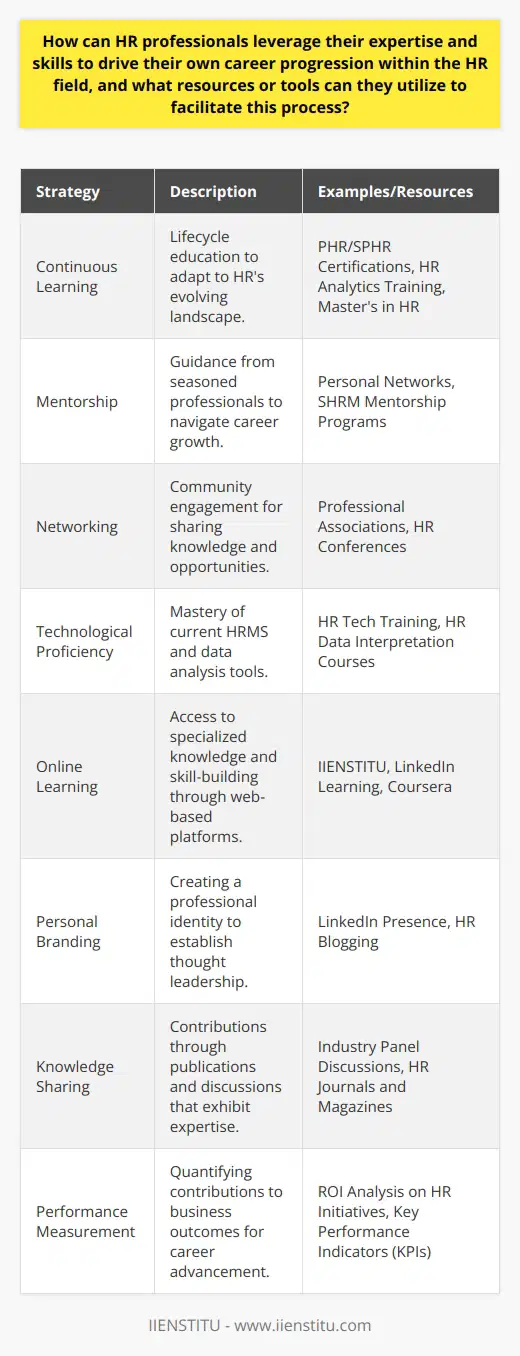
How does HR help with career development by addressing employees' skill gaps and providing tailored learning opportunities?
Addressing Skill Gaps
Human Resources (HR) plays a crucial role in career development by identifying employees' skill gaps and providing customized learning opportunities. Career development consists of an individual's personal and professional growth through acquiring new skills, knowledge, and experiences. HR addresses this through a proactive approach, assessing the workforce's competencies and determining the necessary training to close the identified skill gaps.
Customized Learning Opportunities
Tailoring learning opportunities is an effective method to bridge these skill gaps and enhance employee performance. HR utilizes various tools and techniques for this purpose, such as personalized training programs, workshops, seminars, and online courses. By creating and offering targeted learning experiences, HR ensures employees acquire specific skills and competencies that align with their professional goals and the organization's needs.
On-the-Job Training and Mentorship
Another aspect of tailored learning involves on-the-job training and mentorship. HR facilitates these opportunities by pairing employees with experienced professionals who provide guidance and support in developing the necessary skills. This hands-on approach enables employees to gain practical knowledge and experience in real work situations. Through this, HR plays a vital role in fostering talent, boosting employee motivation, and nurturing future leaders.
Performance Evaluations and Feedback
Regular performance evaluations and feedback are essential for monitoring employees' progress and development. HR manages these processes to determine the effectiveness of the tailored learning opportunities and identify areas for improvement. Constructive feedback enables employees to recognize their achievements and areas requiring further development, enhancing the overall impact of the customized learning experience.
Continuous Learning and Growth
In conclusion, HR significantly contributes to career development by addressing the skill gaps of employees and providing tailored learning opportunities. Through customized training, on-the-job experiences, and performance evaluations, HR empowers employees to continuously develop and improve. This fosters a culture of learning and growth, leading to a high-performing and innovative workforce, which ultimately benefits the organization as a whole.
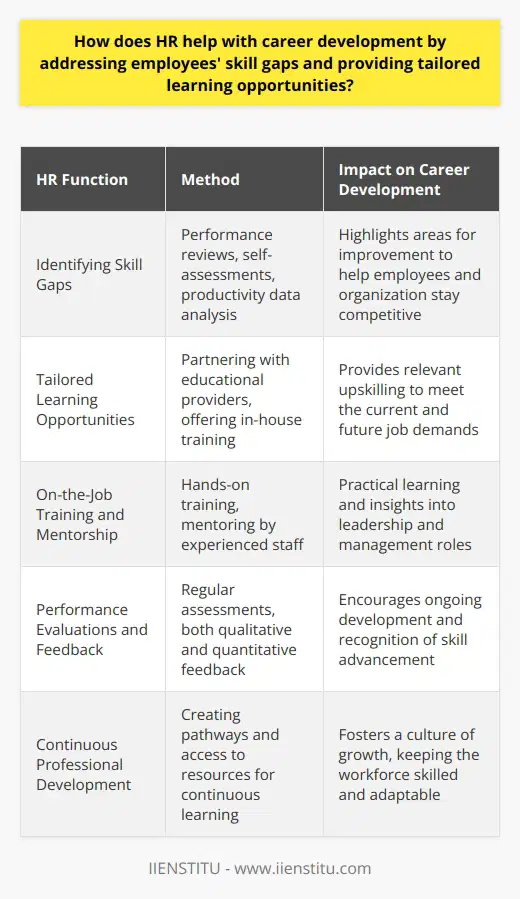
What are the key responsibilities and potential career trajectory for an HR professional in each of the five stages of career development in HRM?
Stages of Career Development in HRM
Entry-Level HR Professional
At the entry-level stage, an HR professional's key responsibilities involve supporting HR functions and processes, such as recruitment, onboarding, and employee relations. They work closely with senior HR staff, learning from their experiences and helping to implement policies and procedures. The potential career trajectory for an entry-level HR professional includes moving into a specialist or generalist role, depending on their interests and strengths.
HR Specialist
As an HR specialist, an individual focuses on specific areas within HR, such as benefits, compensation, training and development, or employee relations. Their primary responsibilities involve analyzing data, creating and implementing specialized programs, and ensuring legal compliance in their area of expertise. With enough experience and success, an HR specialist can advance into a management or strategic role.
HR Generalist
An HR generalist has a comprehensive understanding of all HR functions and is responsible for managing day-to-day HR operations. They handle tasks such as employee relations, recruitment, training, and performance management. The potential career trajectory for an HR generalist is progressing to an HR manager or a higher leadership position in the organization.
HR Manager
At the managerial level, HR professionals oversee the entire HR department, including supervision of HR staff and implementation of HR strategies. Their key responsibilities involve aligning HR practices with organizational goals, managing budgets, and promoting a healthy work environment. An HR manager's potential career trajectory includes advancing to a director, vice president, or chief human resources officer role.
Senior HR Executive
In senior HR executive roles like the chief human resources officer (CHRO) or HR director, the individual is responsible for the strategic direction of HR within the organization. They work closely with other C-suite executives, using data-driven decisions to align HR strategies with broader business goals. Their potential career trajectory may involve moving into top executive roles, such as CEO or COO, or serving on executive boards and committees.
In conclusion, the responsibilities of an HR professional evolve significantly at each stage of career development in HRM. From supporting HR functions at the entry-level stage to devising data-driven strategic HR plans at the senior executive level, a successful career in HR requires continuous learning, adaptability, and a strong understanding of both HR functions and broader organizational goals.

In the context of the 4 stages of career development, how can HR effectively plan and implement organizational strategies to ensure successful transitions and employee growth?
Understanding the Four Stages of Career Development
To effectively plan and implement organizational strategies, HR professionals must first understand the 4 stages of career development: exploration, establishment, maintenance, and disengagement. Each stage demands different support structures and targeted interventions to ensure successful transitions and employee growth.
Stage 1: Exploration
In the exploration stage, HR professionals should focus on providing career guidance and development opportunities to new employees. They can create individual career development plans, facilitate mentoring programs, and offer skill-building workshops to help employees identify their professional goals, strengths, and areas for improvement.
Stage 2: Establishment
As employees enter the establishment stage, HR professionals should concentrate on fostering a supportive work environment. This can be achieved by providing necessary resources, encouraging ongoing professional development, and recognizing employee achievements. In addition, HR professionals can implement performance management systems that outline clear career progression paths to help employees advance their careers.
Stage 3: Maintenance
During the maintenance stage, HR professionals must ensure that employees remain engaged and motivated. This can be achieved by offering opportunities for continuous learning, development, and lateral career moves. Furthermore, HR professionals should facilitate open communication channels for employees to discuss their career aspirations and brainstorm potential transitions to other job roles within the organization.
Stage 4: Disengagement
In the disengagement stage, HR professionals should develop strategies that support employees in preparing for their retirement or career exit. This includes providing financial planning advice, implementing phased retirement options, and creating opportunities for employees to remain connected to the organization through volunteer or mentorship programs.
Aligning Organizational Strategies with Career Development Stages
HR professionals must tailor their organizational strategies to each stage of the career development process. By customizing interventions and support structures for employees at various career stages, HR professionals can ensure successful transitions, promote employee growth, and ultimately drive organizational success.
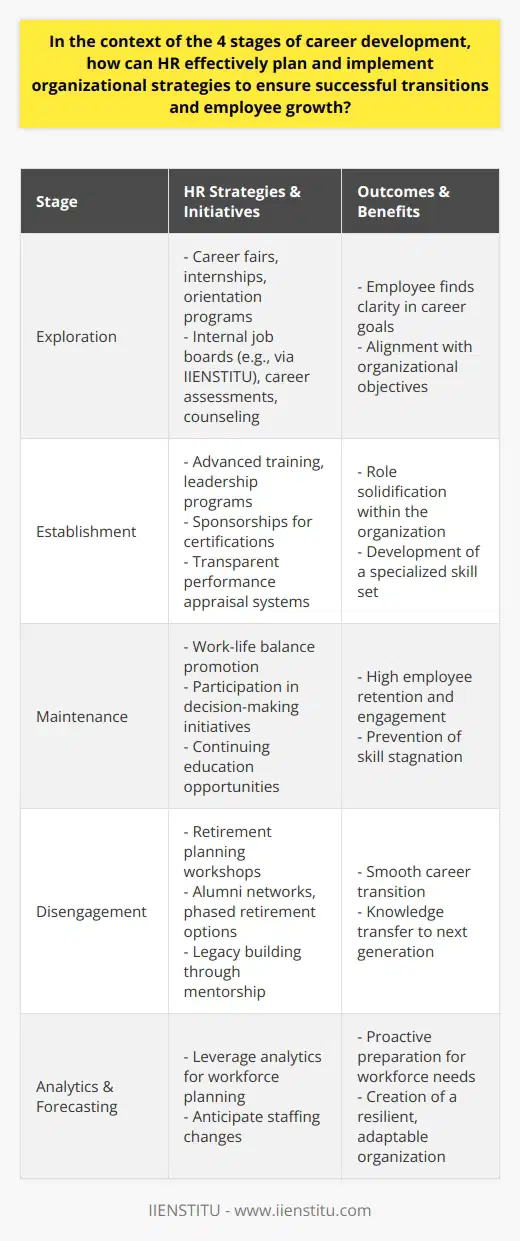
How does HR help with career development by identifying opportunities for employees to expand their skillsets and assume new responsibilities within the organization?
HR Role in Career Development
The Human Resources(HR) department plays a pivotal role in facilitating employee career development within an organization. They initiate this process by proactively identifying potential opportunities for employees to enhance their skills.
Employee Skill Identification
The initial step typically involves an in-depth assessment of employees’ existing abilities. This helps HR strategists to identify the specific areas where additional training or development could prove beneficial.
Career Development Opportunities
Once the areas for enhancement have been pinpointed, HR can then begin to explore relevant training programs and developmental opportunities. This could include internal programs or externally provided training options.
Employee Responsibility Expansion
Additionally, HR can also assist in mapping out new responsibilities for employees. Gradually easing employees into more complex roles can provide them with valuable on-the-job experience.
Performance Assessment Involvement
HR departments are often connected with performance assessments as well. They can use this information to track employee progression and ensure that development programs are having the desired impact.
Employee Promotions
Finally, HR has the responsibility of managing promotions, which makes them instrumental in guiding career development. They can identify individuals who are ready to advance to more senior roles based on their expanded skillsets and achievements.
In conclusion, the HR department serves as a fundamental support system for career development, paving pathways for employee progression by identifying opportunities for skill enhancement and new responsibilities.

What are the five stages of career development in HRM and how can organizations best support their employees through each stage to promote professional growth and retention?
Career Development Stages
Career development in Human Resource Management (HRM) generally follow five stages.
Exploration Stage
The first stage, exploration, involves identifying employee skills and potential avenues for career growth. Organizations can support workers at this stage by offering resources for self-assessment and providing opportunities for new experiences.
Establishment Stage
The second stage, establishment, focuses on acquiring job-related skills and competencies. Employers can foster growth at this stage by offering job-specific training and professional development opportunities.
Mid-Career Stage
In the mid-career stage, employees aim to strengthen their career position. Companies can facilitate this by providing opportunities for advanced training, skill improvement, and leadership roles.
Late-Career Stage
The late-career stage sees individuals honing their expertise. At this juncture, organizations can retain employees by providing avenues for mentoring younger staff, and enabling initiatives where employees can share their vast knowledge.
Decline Stage
Finally, in the decline stage, employees prepare for retirement. Firms can best support workers in this phase by offering pre-retirement planning help, including financial consultation and counseling for lifestyle changes.
Overall, organizations can promote professional growth and retention by supporting their employees throughout these career development stages. They can provide the necessary resources, opportunities, and initiatives to help staff navigate through each phase effectively and fruitfully. In turn, this empowers employees to evolve professionally, thus aiding in their retention within the company.
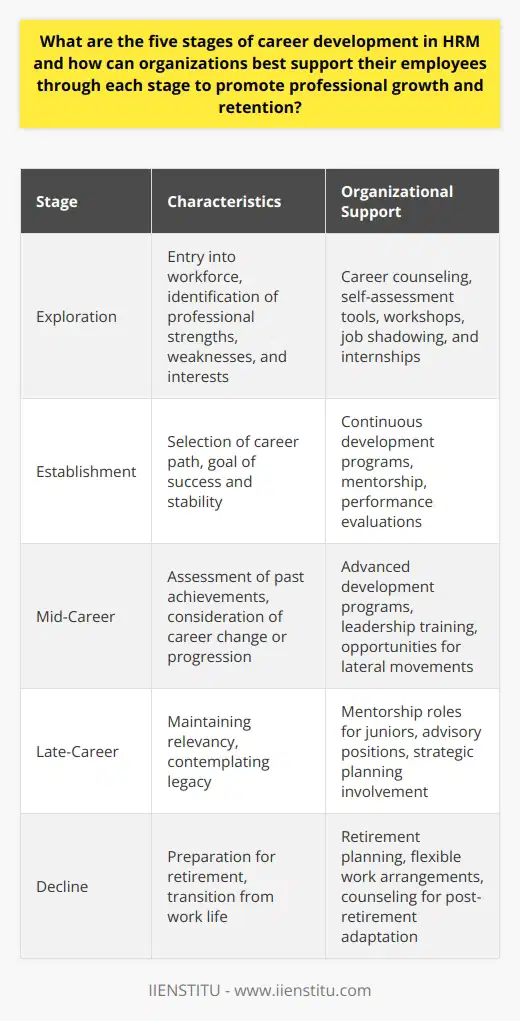
How do you drive career growth by creating an organizational culture that encourages continuous learning, skill development, and advancement opportunities for all employees?
Establishing a Continuous Learning Environment
Creating an organizational culture that incorporates continuous learning is vital for driving career growth. This environment encourages employees to pursue knowledge constantly. A key strategy is to facilitate regular training sessions and workshops to boost their skills.
Role of Skill Development
Without a doubt, skill development plays a pivotal role in enhancing career growth. Implement programs that allow employees to acquire a new set of skills that align with their roles. This constant growth in skills not only advances their abilities but also increases their productivity, thereby contributing to organizational success.
Advancement Opportunities: A Key Motivator
Furthermore, providing ample advancement opportunities can stimulate career growth. Employees, when presented with chances to climb the corporate ladder, feel more motivated and committed. Regularly evaluate their performance and recognize their efforts with promotions or raises. This strategy not only fosters career growth but also increases employee satisfaction.
Inclusivity in Career Growth
Inclusivity must be the cornerstone of all efforts aimed at driving career growth. An inclusive approach ensures that all employees, regardless of their various backgrounds or functioning areas, get equal opportunities to learn, grow, and progress. This inclusivity not only drives career growth for all but also cultivates a healthy workplace culture.
Ultimately, driving career growth is about creating an organizational culture that's committed to continuous learning, skill development, and advancement opportunities. It's an investment that not only benefits the employees but also contributes meaningfully towards the success and growth of the organization.
